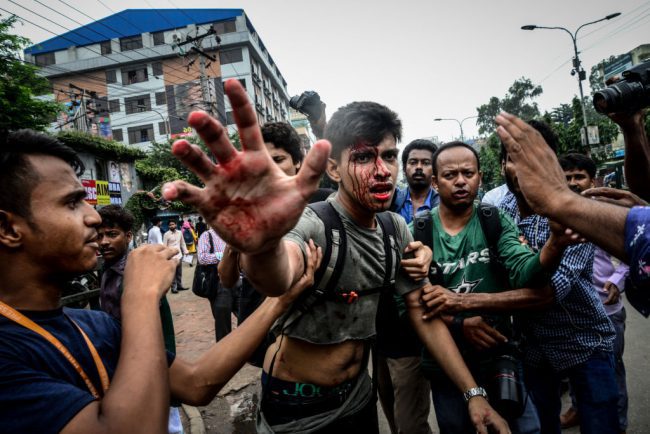Student protests in Bangladesh turned violent over the weekend after pro-government youth activists attacked students with clubs, while police fired tear gas to break up the demonstrations.

Authorities suspended mobile internet services for 24 hours Saturday night in an effort to quell unrest on social media, as graphic photos and videos circulating on Twitter appeared to show a boy whose right eye had been gouged out, allegedly by a pro-government assailant.
Bangladesh’s anti-terrorism police even arrested popular actress and model Quazi Nawshaba Ahmed after she said on Facebook Live that pro-government assailants had killed two students and gouged out another’s eye, national daily Prothom Alo reported. Authorities accused her of spreading unfounded rumours at the behest of anti-government miscreants.

Protests began to break out July 29 after two college students were killed by speeding buses, with students — many of them teenagers in school uniforms — taking to the streets to demonstrate against the country’s transportation sector, widely seen as unregulated, corrupt and dangerous.
The roads of the capital city Dhaka are a web of gridlock and chaos. Unlicensed drivers, unregistered vehicles and speeding buses are commonplace, police corruption is rife and traffic enforcement often nonexistent.
The students’ wrath was inflamed further after MP and senior transportation official Shajahan Khan appeared to dismiss their concerns. According to the Daily Star, Khan remarked that the deaths of two people didn’t merit nationwide protests, given that the deaths of 33 people in an Indian bus accident last month didn’t prompt any unrest in that country.
READ MORE: 48 killed after overcrowded bus plunges into ravine in India
Student protesters spilled out onto major roads in the capital Dhaka, setting up blockades and checking the licenses and registrations of vehicles, including those of top officials, before allowing them through.
In one case on Thursday, students stopped a police SUV carrying a deputy inspector general, only to find that the vehicle didn’t have a registration certification, and its driver didn’t have a licence to drive, the Daily Star reported.
The deputy inspector general admitted that the driver didn’t have a license and that the vehicle was unregistered, but reportedly said, “This is a government car and I do not know anything about it.”

On Saturday, pro-government activists — members of the ruling party’s youth wing — attacked student protesters and at least five journalists, including an Associated Press photographer who was hospitalized with a head injury.
Footage of the attack on social media showed the photographer surrounded and beaten by nearly a dozen men.
There were also reports that some female protesters were sexually assaulted in the youth activist group’s offices, a charge that it denied, the Daily Star reported.

Social media users in Bangladesh told Global News that they had limited access to mobile internet, although wired and wireless networks appeared to be working.
One student said she was in hiding, amid fears that that pro-government activists were seeking out and attacking youth whose photos and videos of the protests went viral on social media.
Students have been using the hashtag #WeWantJustice to protest against the government and allied activists.
READ MORE: Thousands of Bangladeshi children work 64 hours a week for global clothing brands
On Sunday, the U.S. Embassy in Bangladesh released a statement condemning the violence against protesters.
“The peaceful demonstrations of the past week in favor of better vehicle and road safety, led by students and school children across Bangladesh, have united and captured the imagination of the whole country,” read the statement.
It added that “nothing can justify the brutal attacks and violence over the weekend against the thousands of young people who have been peacefully exercising their democratic rights in supporting a safer Bangladesh.”
The protests have become a serious embarrassment to the government of Prime Minister Sheikh Hasina ahead of a general election due in December. Her party is blaming the main opposition, led by former prime minister Khaleda Zia, for using the student anger to create chaos for political gains. Political feuding between the two political leaders has dominated Bangladesh’s politics for more than a decade.
Zia’s party has formally extended its support to the protesters, but Hasina has also reached out to the demonstrators by pledging to improve road safety.
In response to the protests, the government launched a week-long drive to enforce vehicle registrations, but the country’s home affairs minister warned protesters that “if anyone crosses the limit, action will be taken.”
Bangladesh has among the world’s highest rates of fatal road accidents. At least 12,000 people die each year in road accidents in the country.
— With files from the Associated Press




Comments